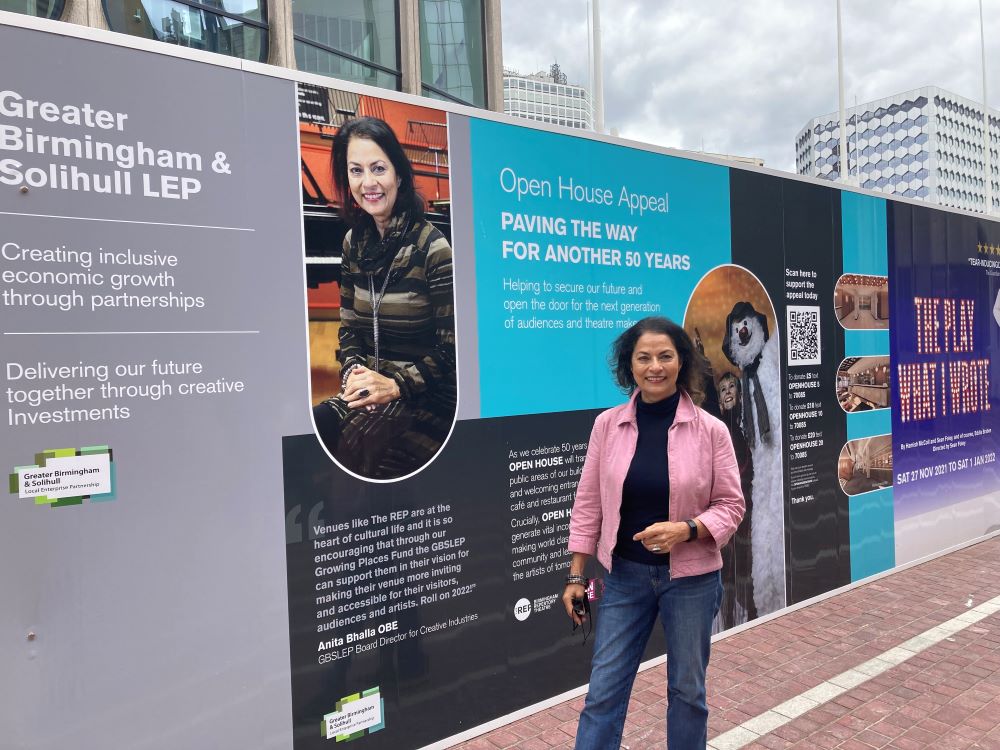Few people in the region are as well known, or popular, across as broad a spectrum of industries as Anita Bhalla. JON GRIFFIN meets this charismatic leader who has left an indelible mark on commercial, cultural, charitable and media organisations over the last four decades.
Anita Bhalla is reflecting with considerable pride and affection on her upbringing in 1960s suburban Birmingham.
“When I go and speak to students they all assume I went to public school, but I grew up in Selly Oak,” she says.
“My dad came here in 1963, the rest of us in ’64. I was very small when I came here so I consider myself a Birmingham girl. I grew up, went to school here so I am a Brummie through and through.”
That Birmingham girl has made quite an impact on the West Midlands and further afield since she and her five siblings arrived from Kenya in an era of often volatile race relations as post-war Britain opened its doors to waves of immigrants seeking new lives thousands of miles from their birthplaces. 
Today, 60 years later, she chairs two of Birmingham’s most prominent institutions – B:Music, the charity responsible for world-renowned artistic landmarks Symphony Hall and Town Hall – and Birmingham City University, the city’s second biggest campus with 33,000 students and 5,000 staff.
Over the course of a distinguished broadcasting career she was one of the pioneers behind the BBC’s Asian Network, helping turn the spotlight on an often thriving community previously ill-served by radio, television and the mainstream media in general.
Those sorts of high-profile roles – and several others she has held – would not have come her way had Bhalla not been determined to ruffle feathers along the way, including some members of the ethnic communities who had arrived in Britain in their tens of thousands in the same decade as her eight-strong family.
Recalling her late 1970s pre-broadcasting days as a community relations officer in Leicester – then a hotbed of racial tension stoked by the far-right National Front in the face of a wave of immigration from Asia in particular – Bhalla proudly remembers the battles she once fought.
“I offended so many people. The Asian community because I was teaching our girls to run away, and the National Front smashed our offices. Asian men with placards demanded that I be sacked because they thought I was corrupting their girls.
“I offended everybody for trying to do what I thought was right – but that’s fine because it was for a good cause.”
It is now nearly 50 years since she took on adversaries as diverse as the National Front and intransigent Asian fathers in the name of good causes, and the Nairobi-born daughter of 60s immigrants is still taking up the cudgels on behalf of causes close to her heart.
Inspired by her parents’ example – her father became a shop steward at a Birmingham battery factory and her mother worked on the shopfloor at Cadbury’s – Bhalla’s character was forged on the streets of Selly Oak, long before she was stalking the corridors of power at the BBC and high-profile Birmingham institutions.
“My father had decided to take a bold step so we left our gorgeous house in Kenya and came to Selly Oak to live in a two up and two down. He came to Birmingham thinking naively he was going to get a job in an office or as a civil servant.
“But the only job he got was at Birmingham Battery, a foundry in Selly Oak, notorious for a really poor health and safety record. Because my dad could speak English he became a shop steward.
“In those days the new migrants hadn’t really settled and created networks, so our tiny house was always full of people coming to my dad for advice. My dad had a big, big heart.
“He would go around collecting students at Birmingham University who didn’t have families here. On a Sunday night in our little terraced house my dad would go to the fish and chip shop and sit with the students who had arrived, and we would watch our little black and white telly.
“People ask why I get involved in charity and voluntary work . . . watching my father do what he did was amazing.”
The young Anita was similarly inspired by her mother’s determination to provide a secure family life and a good education for her six children.
“New to this country and managing all kinds of things, including racism, she brought up six of us in a terraced house.
“I remember one day my mum had stones thrown at her and her head was cut. But she was a fierce, fiery woman. Nothing was going to get to her.”
Ignoring her career teacher’s advice that she should become a traffic warden or a nurse, Bhalla trained as a teacher at Birmingham University’s School of Education but would eventually cut her teeth in the workplace as a community relations officer in Leicester. There, she took on the likes of the National Front while fighting for the often neglected rights of young Asian women and Afro-Caribbean youths from poverty-stricken households.
Leicester’s loss became Birmingham’s gain when Bhalla returned to her adopted home city as a community worker in Handsworth, helping to set up a hostel for Asian girls and women. By then she had caught the attention of the BBC – and a 26-year association with Auntie was born as the community activist brought her vision and energy to the world of broadcasting, initially with the then BBC Radio Birmingham.
“I was presenting Asian programmes,” she says. “Our two-hour show used to get sackfulls of letters. But they didn’t take us seriously until the BBC needed to find a way to develop Asian programmes, and I was offered the job of setting up the Asian Network here in the mid 1980s.
“I left the community worker’s job in Handsworth, thinking I was going to the BBC for six months to set up the Asian Network. I stayed for 26 years.”
More than a quarter of a century later, Bhalla is fiercely proud of the legacy of the BBC Asian Network. “I literally picked young people from the streets and trained them. It was the only way to find them. There were previously no young people from Asian backgrounds. Birmingham was at the cutting edge of all Asian programmes, TV and radio.”
Ever the pioneer and glass ceiling demolition exponent, she caused something of a stir within BBC circles when she refused to wear a sari on screen.
“I was brought in to represent young people and provide a young voice,” says Bhalla. “I didn’t wear saris and did my broadcasting in English.
“The producer told me later we used to get some horrendous mail from Asian men saying “take her off, she is corrupting our young people, she doesn’t wear our clothes, she doesn’t speak in our language”. I have kind of spent time offending people in my life, but all in a good cause.”
Other high-profile roles followed at the BBC, from a bi-media correspondent for TV and radio before climbing the ladder to head of political and community affairs for England and head of Public Space Broadcasting UK.
During her 26 years with the BBC, Bhalla had also worked in various civic roles. These included long-serving chair of the Midlands Arts Centre – where she helped oversee a £17.5 million fundraising effort to transform a rundown facility – a school governor, working with an Asian Resource centre and other civic duties. But she finally left the clutches of the BBC to join Andy Street as a board member at the Greater Birmingham and Solihull LEP to help champion the creative industries.
She would eventually become chair of the LEP and remains saddened by its recent demise. “It’s folly, it’s a mess. In this region we had one of the best functioning LEPs with money even at the end when I had to wind the organisation down. We were solvent, we left a legacy.”
But with the closing of doors at the LEP and the newly refurbished MAC came the opening of other prominent Birmingham doors – in the shape of the Symphony Hall and Town Hall.
“I had always said that when we had finished the MAC rebuild and we were in the black, I would leave. It was time for me to come to Symphony Hall. I stepped down from the MAC in 2016.
“I was on the shadow board of Town Hall when it finally re-opened and the funds were raised to redevelop it. At the end of it we started thinking that it didn’t make sense for the Symphony Hall to be here, Town Hall there, and for them to be programmed separately because of the clash . . . we were fishing in the same pond for audiences.”
Bhalla, who admits she can be “quite persistent” when the occasion demands, persuaded the then leader of Birmingham City Council Sir Albert Bore to bring the Symphony Hall and Town Hall together under one new charitable banner in the guise of B:Music. 
“It was one of the best things that has happened to the city centre. We brought in Nick Reed as our new CEO from Bridgewater Hall in Manchester and Nick absolutely got how a charity can work in a commercial way.
“We had a challenge – we are a charity but nobody sees us as a charity. They always thought we were part of the ICC. We had to do something to make ourselves financially viable but also to have an image that we are an arts organisation, not attached to a conference centre.”
A £13.5 million fundraising campaign, backed by money from the Arts Council, the LEP and other sources, provided a new lease of life for the Symphony Hall, with new bars, performance space, a new entrance and cafe. The refurbishment of the hall survived its closure during Covid and the relaunch was delivered on time and within budget.
The reincarnations of both the previously mothballed Town Hall and the Symphony Hall notwithstanding, the chair of B:Music is keen to stress the organisation’s charitable status and role in the community.
“We work with schools and have a summer school every year where young people come to play music. You don’t have to read music, you don’t have to have had lessons, you just come to one of our classes. I am passionate about music. I think it helps change lives.
“We can now open our new performance space to communities. It is being used by poets, by young people, black voices, it has become a real community space.”
Bhalla, CEO Nick Reed and the management team are also keen to dispel the image of Symphony Hall as purely a classical music venue. “People forget that only 20 per cent of what we do is classical, the rest is rock, pop, comedy and other entertainment. I think the greatest message to get across is that we are a charity, whatever we earn goes back into running Town Hall and Symphony Hall.”
At Town Hall the charity is overseeing a new fundraising archiving project to preserve the memory of performers who once trod the boards at the venerable venue, with personal readings spotlighting Dickens to the Beatles, Lloyd George to Chuck Berry.
The stars may have come and gone down the years, but in 2024 Bhalla firmly believes the importance of inward investment into the city centre because of the presence of the Symphony Hall and Town Hall cannot be overstated.
“You talk to the likes of Arup and HSBC and they say the thing that attracts them is that their staff can have access to the REP, Town Hall, the Symphony Hall. The cultural offering to invest and come in is very powerful.
“I don’t think the creative and culture sector is just a soft power, we are bigger than that. More than 1.2 million people come into the city for music tourism. That is hard cash coming in. We are not the icing on the cake – we are part of that economic cake.”
And you could also argue that Anita Bhalla, the little girl who arrived in distant Birmingham from Kenya 60 years ago to watch her parents build a whole new life for the family, is helping to deliver that cake.

Firm eyes £200m turnover
Law firm supports deal
Inspirational role models are celebrated
